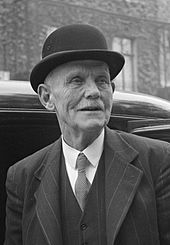
A lottery is a form of gambling that involves the drawing of numbers at random for a prize. Some governments outlaw lotteries, while others endorse it to the extent of organizing a national or state lottery. It is common to find some degree of regulation of lottery by governments. The most common regulation is prohibition of sale to minors, and vendors must be licensed to sell lottery tickets. Although lotteries were common in the United States and some other countries during the 19th century, by the beginning of the 20th century, most forms of gambling, including lotteries and sweepstakes, were illegal in the U.S. and most of Europe as well as many other countries. This remained so until well after World War II. In the 1960s, casinos and lotteries began to re-appear throughout the world as a means for governments to raise revenue without raising taxes.

The Irish Derby is a Group 1 flat horse race in Ireland open to three-year-old thoroughbred colts and fillies. It is run at the Curragh over a distance of 1 mile and 4 furlongs, and it is scheduled to take place each year in late June or early July.
Events from the year 1934 in Ireland.
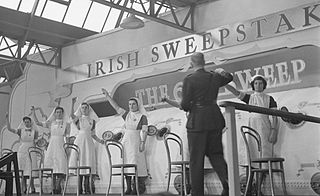
In the United States, a sweepstake is a type of contest where a prize or prizes may be awarded to a winner or winners. Sweepstakes began as a form of lottery that were tied to products sold. In response, the FCC and FTC refined U.S. broadcasting laws. Under these laws sweepstakes became strictly "No purchase necessary to enter or win" and "A purchase will not increase your chances of winning", especially since many sweepstakes companies skirted the law by stating only "no purchase necessary to enter", removing the consideration to stop abuse of sweepstakes. Today, sweepstakes in the United States are used as marketing promotions to reward existing consumers and to draw attention to a product. By definition, the winner is determined by pure random chance rather than skill.

Joseph McGrath was an Irish politician and businessman. He was a Sinn Féin and later a Cumann na nGaedheal Teachta Dála (TD) for various constituencies; Dublin St James's (1918–1921), Dublin North West (1921–1923) and Mayo North (1923–1924), and developed widespread business interests.

The Georgia Lottery Corporation, known as the Georgia Lottery, is overseen by the government of Georgia, United States. Headquartered in Atlanta, the lottery takes in over US$1 billion yearly. By law, half of the money goes to prizes, one-third to education, and the remainder to operating and marketing the lottery. The education money funds the HOPE Scholarship, and has become a successful model for other lotteries, including the South Carolina Education Lottery.
The numbers game, also known as the numbers racket, the Italian lottery, Mafia lottery or the daily number, is a form of illegal gambling or illegal lottery played mostly in poor and working-class neighborhoods in the United States, wherein a bettor attempts to pick three digits to match those that will be randomly drawn the following day. For many years the "number" has been the last three digits of "the handle", the amount race track bettors placed on race day at a major racetrack, published in racing journals and major newspapers in New York.
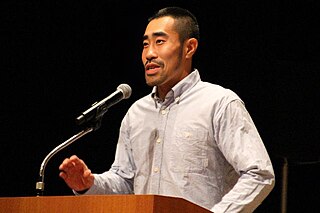
Tomoaki Hamatsu, better known as Nasubi, is a Japanese comedian. Hamatsu is best known for appearing on the controversial reality television show Susunu! Denpa Shōnen.

Waking Ned is a 1998 comedy film written and directed by Kirk Jones and starring Ian Bannen, David Kelly, and Fionnula Flanagan. Kelly was nominated for a Screen Actors Guild Award for his role as Michael O'Sullivan. The story is set in Ireland but was filmed on the nearby Isle of Man.

The Hospital and Free School of King Charles II, Oxmantown, also called The King's Hospital is a Church of Ireland co-educational independent day and boarding school situated in Palmerstown, County Dublin, Ireland. It is on an 80-acre campus beside the River Liffey, called Brooklawn, named after the country houses situated on the site and in which the headmaster and his family reside. The school is also a member of the HMC Headmasters' and Headmistresses' Conference and the BSA.

Lottery! is an American anthologic drama that premiered on ABC on September 9, 1983. The series aired for one season of 17 episodes and starred Ben Murphy as Patrick Sean Flaherty, and Marshall Colt as Eric Rush. Lottery! centered on ordinary people who have won the lottery—all of a sudden becoming millionaires—and how it changes their lives.
Events from the year 1934 in the United Kingdom.
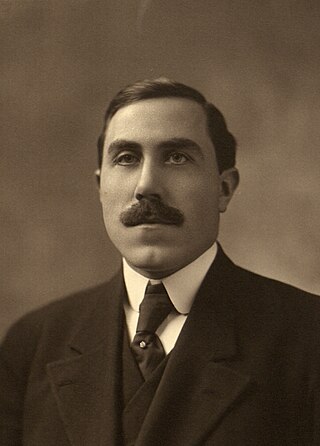
Joseph McGarrity was an Irish-American political activist best known for his leadership in Clan na Gael in America and his support of Irish Republicanism back in Ireland.
The New Hampshire Lottery was established in 1964, making it the third-oldest lottery in the United States, and the oldest in the contiguous United States. New Hampshire's lottery games include Lucky for Life, Mega Millions, Powerball, Tri-State Megabucks Plus, and numerous scratch tickets. All New Hampshire Lottery games require players to be at least 18 years old.
Bank Night was a lottery game franchise in the United States during the Great Depression. It was invented and marketed by Charles U. Yaeger, a former booking agent for 20th Century Fox.
The Liffey Handicap Hurdle is a National Hunt hurdle race in Ireland which is open to horses aged four years or older. It is run at Leopardstown over a distance of about 2 miles (3,219 metres), and during its running there are eight hurdles to be jumped. It is a handicap race, and it is scheduled to take place each year in late January or early February.

The National Lottery is the state-licensed lottery of the Republic of Ireland. Established in 1986 to raise funds for good causes, it began operations on 23 March 1987 when it sold its first scratchcards. It launched the weekly drawing game Lotto the following year, holding the first draw on 16 April 1988. It now offers EuroDreams draws on Mondays and Thursdays, EuroMillions and Plus draws on Tuesdays and Fridays, Lotto and Lotto Plus draws on Wednesdays and Saturdays, and two Daily Million draws each day. Its other games include televised bingo, an annual Millionaire Raffle, and online instant-win games. The minimum age to play all National Lottery games is 18.

Lottery fraud is any act committed to defraud a lottery game. A perpetrator attempts to win a jackpot prize through fraudulent means. The aim is to defraud the organisation running the lottery of money, or in the case of a stolen lottery ticket, to defraud an individual of their legitimately won prize.
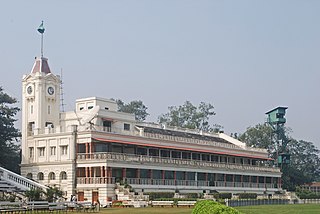
The Royal Calcutta Turf Club (RCTC) is a horse racing organisation which was founded in 1847 in Calcutta, British India. Horse events and sports were initially organised for the British cavalry at Akra before they were moved to the Maidan. The RCTC became the foremost horse-racing organization in India during the British Raj. At one time it was the governing body for nearly all racecourses in the subcontinent, defining and applying the rules governing the sport. During its heyday, RCTC-organised races were among the most important social events of the bigwigs' calendar and were opened by the Viceroy of India. Still a private club, the RCTC operates Kolkata Race Course in the Maidan.

The Betting and Lotteries Act 1934 was an Act of the Parliament of the United Kingdom and had three sections: Betting, Lotteries and Prize Competitions, and General.

